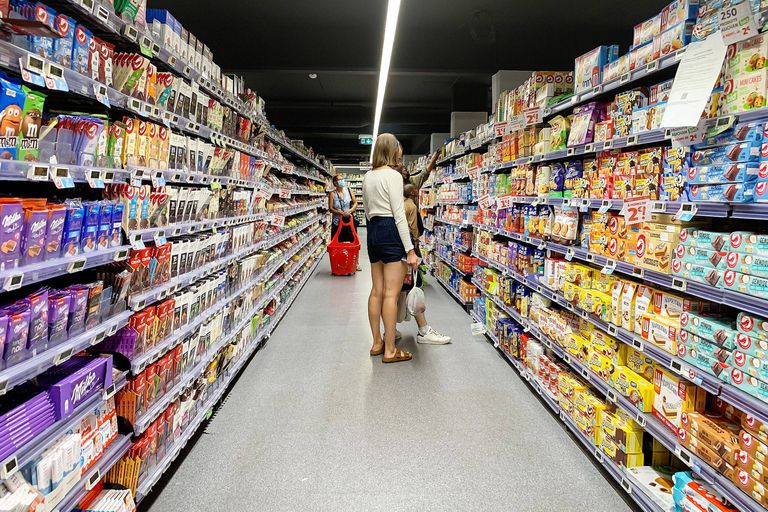To what extent do supermarkets contribute to a sustainable food system? That is the central question behind the Environmental Super List, an initiative of the Dutch sustainability think tank Questionmark and a host of NGOs, including Rikolto, Bond Beter Leefmilieu and BOS+.
The Super List analyses the range, promotions, and policies of the five largest supermarkets in Belgium - Delhaize, Colruyt, Aldi, Lidl, and Carrefour - which together account for a market share of more than 80 percent. “Supermarkets can be an important lever in making our food more sustainable,” Erik Mathijs, expert in sustainable food systems at KU Leuven, and an advisor on the study, told De Morgen. “We buy most of our food there, and the way they offer and promote their products has a major impact on what we eat.”
The Super List looks at three aspects that are important in the transition to a more sustainable food system: reducing our meat consumption, producing food sustainably and avoiding food waste.
Delhaize and Lidl come out as front runners, Colruyt and Aldi do less well while Carrefour comes last. The supermarkets usually score less than a quarter of the maximum score they could achieve on each component. In general, differences between the supermarkets are small and the margin for improvement is large. “Supermarkets can do much more for the environment and the climate,” Jelle Goossens of Rikolto, told De Morgen.
Our meat and dairy consumption has a major impact on climate, environment, and biodiversity due to greenhouse gas and nitrogen emissions created in the production processes and the large amount of land both industries require. We currently get about 60 percent of our proteins from animal products, and 40 percent from plants. With the Green Deal Protein Shift, the Flemish government wants to reverse that ratio by 2030. Although the supermarkets have endorsed this objective, they are not doing enough to achieve this, according to the Super List.
The research shows that supermarkets sell almost three out of four pre-packaged meat products in portions of more than 100 or even 150 grams. If they offer protein-rich products as a promotion, then seven out of ten are meat or fish. Two out of three ready-to-eat meals contain animal protein. “In this way, the range stimulates a large consumption of non-sustainable animal proteins,” says Goossens.
In the meat reduction category, Delhaize leads the way with its relatively extensive range of vegetarian products. “But increasing the vegetable supply is only part of the story,” says Goossens. “We lack efforts and clear targets to reduce meat sales at the same time.”
The responsibility of finding out whether the food you buy is sustainable or not usually falls on customers, the Super List reveals. “Supermarkets place the responsibility for making sustainable choices with the consumer,” says Goossens. “While we would like the entire range to be sustainable. But sustainable products are not the norm.”
However, it is not entirely clear what 'sustainable food' exactly means. 'Local' is an oft-used criterion. Supermarkets provide too little information about the origin of products, concludes the Super List. Although its relevance is limited. With the exception of that sun-ripened mango flown in from tropical climes, what you eat and how it was produced weighs more heavily in the environmental impact than transport.
Only a small part of the range carries a sustainability label. But labels such as the organic label are not a panacea either, because organic farming takes up more space due to the lower yields. “There is no consensus about what exactly is sustainable,” says Mathijs. “There is a need for generally accepted standards.”
A specific point of attention is deforestation in the cultivation of soy for animal feed, palm oil and cocoa. “Supermarkets are concentrating on their own brands,” Pieter Van de Sype from BOS+ told De Morgen. “But they should also demand guarantees from other suppliers that their products have not led to deforestation.”
Lidl takes first prize in this category, because of its transparency about the origin of fruit and vegetables and concrete objectives to limit deforestation.
Every year, hundreds of thousands of tons of food are lost in Flanders. Supermarkets contribute to this when they cannot sell products in time or encourage consumers to buy more than they can use in time with bulk packaging and '2+1 free' promotions. The Super List examined the extent to which supermarkets have concrete and measurable plans to reduce food waste.
All supermarkets are aware of their role and are taking action in one way or another, for example by selling products approaching their expiration date at a discount or donating surpluses. “But in general, there is a lack of clear reporting and measurable objectives,” says Goossens. Delhaize comes out on top here as the only supermarket with a clear action plan.

